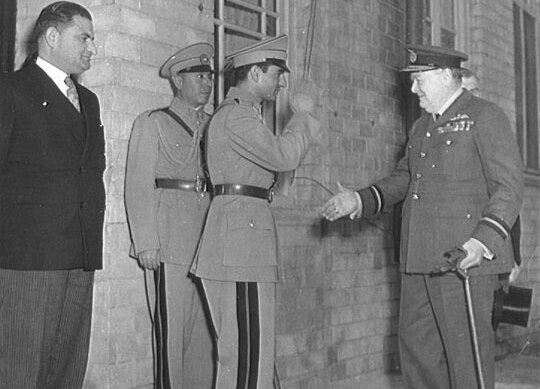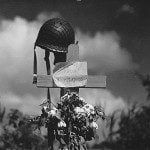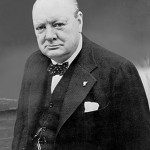
(Wikimedia Commons public domain)
I never met Mr. Churchill, but, for what it’s worth, I did meet and speak with the Shah for a few minutes during his exile in Cairo. I recall being quite astonished at the fact that I was shaking the hand of a man who had, as a fellow head of state, shaken the hands of Roosevelt, Churchill, and Stalin at that conference. It was oddly moving.
In scattered moments at the beginning of the day and at its end, I’ve been reading a condensed version of Churchill — Der Kampf ums Überleben 1940/65, which is a German translation of Winston Churchill –The Struggle for Survival 1940-1965, which (in its turn) is allegedly (though somewhat controversially) based on the diary of Lord Moran (Sir Charles Wilson), his personal physician. It offers an interesting perspective on Churchill and the Second World War. I’ve marked just a few passages thus far that especially caught my interest, and I offer them here either in paraphrase or, oddly, in an English translation of the German translation of the English original:
“The most important thing in politics,” said our host [the then Canadian prime minister Mackenzie King], “is to avoid mistakes.” I could imagine the PM’s [Churchill’s] face as Mackenzie King made this observation, looking at us through his pince-nez. The two men are, naturally, friendly to one another, but it cannot be concealed that Churchill isn’t especially interested in King, while he flatly courts Roosevelt. (Ottawa, 29-31 December 1941; pages 256-257)
The expressly risk-averse King was a polar opposite to the deliberately daring Winston Churchill (see below).
While the others were changing for dinner, [Jan Christian] Smuts [the South African general, statesman, and philosopher] sits out in the garden alone. This evening, I kept him company. I offered him my books, but he said that he reads no novels. He always carries a handbook of botany with him, and it is said that a Greek Bible sits on his nightstand. He is of the opinion that a man with ideas is more important than a coolly deliberative head. “That is why Winston is indispensable. He has ideas. Men of action, by contrast, live on the surface of things; they’re not creative.” (Cairo, 7 August 1942; page 266)
I’ve already mentioned the exchange between Smuts and Churchill regarding Gandhi that occurs on the same page.
This morning, the PM spoke with me about the long and painful learning period that he had to pass through. Few people have worked with such almost religious dedication on the craft of using words. In peacetime, he used it to make his political fortune; in wartime, he won everybody’s heart by means of it. “It began already at Harrow,” he said. Sitting in the back of the class, always in others’ shadow, he discovered that he could do something that others couldn’t: write. From the beginning, it was his goal “to distinguish myself personally,” and, in particular, he wanted to become a great orator. He read everything he could find about Lord Chatham [William Pitt the Elder], the mighty eighteenth century statesman; he studied his father’s [Lord Randolph Churchill’s] speeches, and practiced his own in front of the mirror.
He told me this very plainly. Occasionally, he interrupted himself when his voice disobeyed him out of sheer emotion. As I listened to him, I saw the sensitive boy, beaten up and tyrannized, grow to be a man, short of stature, with thin, unmuscular limbs and the white, delicate hands of a woman. He lisped and stuttered a bit. Whenever he began to give a speech in the House of Commons, he was always anxious lest something come out that would blight his prospects. “At that time,” he reported, “I absolutely could not speak without the most careful preparation.” On one occasion, he stood up in Parliament and realized that his mind had gone completely blank; there was respectful silence all around him that was interrupted only by a few friendly calls of encouragement. He returned to his place and hid his face in his hands. Thereafter, he was even more reluctant than before to try to put in a word. But he refused to recognize defeats.
I’m astonished at his willpower and his dedication to his goals. He was determined to become robust and hardy, and, in wartime, he deliberately exposed himself to danger. In France, during the First World War, he rode a white horse in the front lines because he wanted to test his nerve. And he worked hard on himself to cope with the humiliations and injustices of life and overcome them. . . .
“When I was young,” the PM reflected, “a deep depression came over me that lasted two or three years. As soon as I spoke with Clemmie, though, it got better. Still today, though, I don’t like to stand on a train platform when an express train races by; I also don’t like to stand at the railing of a ship and look down into the water. A second’s decision, a few drops of despair — and everything would be at an end. And yet, at such moments, I really don’t want to depart this world.
“Do you know much of grief, Charles? It helps me to try to write down a half dozen things that trouble me. Two of these problems, let’s say, will solve themselves. Two of them can’t be changed, so there’s no point in driving oneself crazy over them; and two of them might be manageable.” . . .
He called his bouts of depression “the black dog.” I said “You inherited ‘the black dog’ from your ancestors and you’ve fought against it y0ur entire life. That’s why you don’t visit military clinics or hospitals. You always avoid anything that might bring you down.”
He stared at me as if I knew too much. Finally, he said “Presumably you believe in a life after death. You’ve surely learned to think logically. Please explain to me how you can believe in such a thing.”
I had the feeling that he desperately wanted to believe in something too, but that it wasn’t easy for him. (London, 29 October 1943; pages 289-291)
There’s something reminiscent of Theodore Roosevelt in Churchill’s determination to overcome youthful weakness and become “robust and hardy.” And, ironically, Churchill’s practice of rehearsing his speeches in front of a mirror, at least in his early political career, recalls Adolf Hitler’s similar practice. In a sense, World War Two was a contest between two master orators.
Posted from Richmond, Virginia












